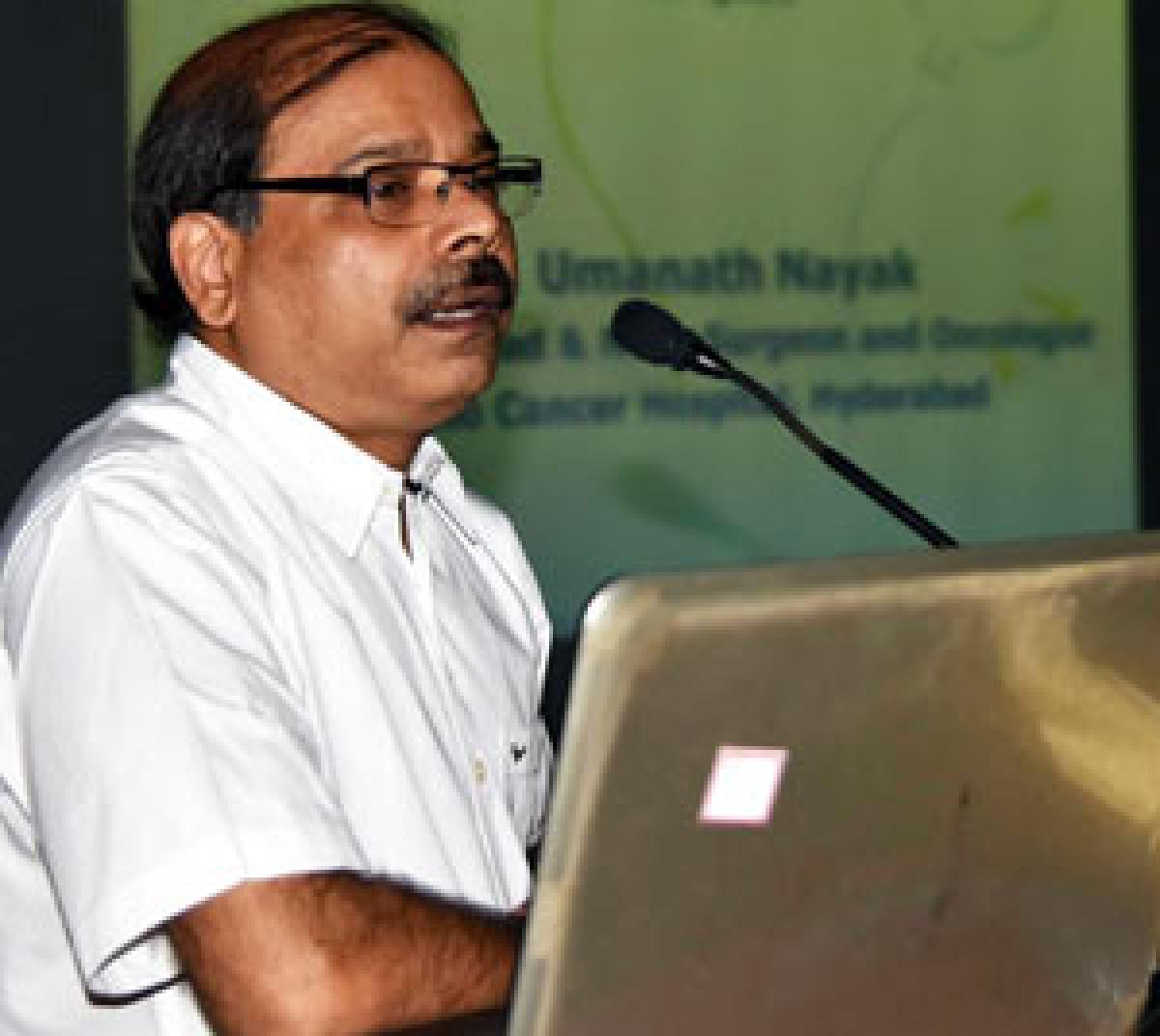Live
- 555th Prakash Purab celebrated with gaiety
- Good news for Atmakur farmers
- High-risk aortic valve replacement surgery performed successfully
- HMWSSB MD holds review meeting on OTS-2024 scheme
- Dhobi Ghat assessed for potential to host sports complex
- SCR bets on LHB train coaches for safety
- SVU felicitates best teachers
- Tata Group to market Araku coffee
- Union Min assures development of infra in tribal mandals
- KTR, Harish will turn political rivals soon: TPCC Chief
Just In

Delivering the 243rd Monthly Health Lecture of the Public Gardens Walkers’ Association (PGWA), Head and Neck Cancer Surgeon from Apollo Cancer Hospital, Dr Umanath Nayak outlined on the topic, ‘Coping with Cancer—way to deal and live with it’ at Public Gardens in Nampally on Sunday.
 Delivering the 243rd Monthly Health Lecture of the Public Gardens Walkers’ Association (PGWA), Head and Neck Cancer Surgeon from Apollo Cancer Hospital, Dr Umanath Nayak outlined on the topic, ‘Coping with Cancer—way to deal and live with it’ at Public Gardens in Nampally on Sunday. “A cancer patient needs to develop strategies for coping right from the time of the diagnosis and treatment until much later, and throughout life,” said Dr Nayak.
Delivering the 243rd Monthly Health Lecture of the Public Gardens Walkers’ Association (PGWA), Head and Neck Cancer Surgeon from Apollo Cancer Hospital, Dr Umanath Nayak outlined on the topic, ‘Coping with Cancer—way to deal and live with it’ at Public Gardens in Nampally on Sunday. “A cancer patient needs to develop strategies for coping right from the time of the diagnosis and treatment until much later, and throughout life,” said Dr Nayak.
“This is the time when the patient and caregiver should utilise their resources to maximise their knowledge of the disease process, the treatment options and results of treatment,” he said. “The issue of coping acquires even more significance upon the completion of treatment, irrespective of whether the patient is considered cured for the moment or deemed incurable,” explained Dr Nayak.
Patients may become melancholic and isolated, and post-treatment depression is common. “While psychological counselling is beneficial in such cases, due to the paucity of psycho-oncologists in our country, it is left to the individual or a close family member to make a conscious effort to deal with these emotions,” elaborated the doctor.
“Coping issues can be extreme when dealing with incurable cancer, both for the patient as well as for the family. Unlike during treatment, when all resources and efforts are aimed at fighting the cancer, once the battle has been lost and the cancer has persisted or recurred, if no further useful treatment options are available, it is wise to accept the situation and learn to co-exist with the cancer,” he added.
Speaking on the issue of death and dying, the doctor said, “It is the fear of death that makes patients suffer from anxiety and turmoil; makes them angry, moody and depressed. An open admission of the fear of dying can help cope with this eventuality far better than any attempts to ignore it.”
“False assurances of cure must be avoided,” he notified. “Spirituality can also be of major value in dealing with incurable cancer, and introspection into the meaning of one’s existence can provide an oasis of calm for the troubled mind and help deal with the pain and suffering,” explained the doctor.
Dr Nayak also spoke about caring for the terminally ill, the role of Hospice care for such patients and explained about Euthanasia (Death with Dignity) for terminally suffering cancer patients, which is not legalised in India. “There is currently a debate raging among health professionals about its role in the care of the terminally ill,” he said.
Enlightening the audience about the impact of the diagnosis of cancer on the patient and their family, Dr Nayak said, “A diagnosis of cancer evokes varied responses. Some react with disbelief, some with anger. Some blame their stars, some their genes. Most carry a heavy load of helplessness; a few cling to the hope that, with treatment, a cure may happen.” Morning walkers and members of PGWA were present on the occasion.

© 2024 Hyderabad Media House Limited/The Hans India. All rights reserved. Powered by hocalwire.com







